Scootin' Scottie Ale
Have you ever seen a Scottie dog scoot? Pretty funny… or gross, depending on if you’re the owner of the carpet. Anyway, while looking around at options for my next batch of beer, I had originally intended to do a sweeter style brown ale,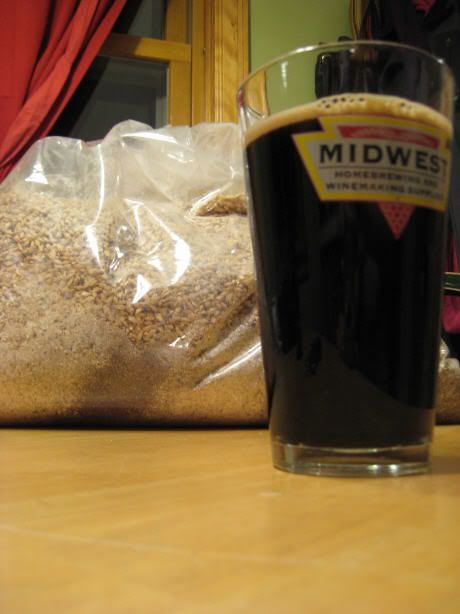 as I’d had a few really good exemplars of the style over the holidays. I got distracted by a slightly different style though after reading around a bit. I’m not a HUGE fan of lagers (I find ales more flavorful, generally) and I already have one lager “lagering,” but I also would like to still try and take advantage of the ambient temps I can find in my Minnesota home in the dead of winter. Solution? A Scottish 80/- Export (the 80/- means 80 shillings, which is how much a beer of this style and alcoholic strength was taxed when it was popular a few hundred years ago — 80 shillings). This strength of Scottish Ale was often the strength sold to other countries, hence “export” in the name.
as I’d had a few really good exemplars of the style over the holidays. I got distracted by a slightly different style though after reading around a bit. I’m not a HUGE fan of lagers (I find ales more flavorful, generally) and I already have one lager “lagering,” but I also would like to still try and take advantage of the ambient temps I can find in my Minnesota home in the dead of winter. Solution? A Scottish 80/- Export (the 80/- means 80 shillings, which is how much a beer of this style and alcoholic strength was taxed when it was popular a few hundred years ago — 80 shillings). This strength of Scottish Ale was often the strength sold to other countries, hence “export” in the name.
The yeast used by this style of ale is a perfect match to the ambient temps in my house right now. Primary needs 60-65*, which I can easily find in my basement, and secondary needs 35-45* which I can easily find in the closet next to my garage.
I knew I liked this type of beer because I bought a six pack of Odell’s 90 Shilling last summer and the taste has stuck in my mind ever since. Big fan of how smooth and flavorful it was. A nice alternative to IPA’s in my opinion. Completely different… but so completely different that it’s as interesting (even for a fan of IPAs) to try.
Base malt: 11 lbs domestic 2-row
Specialty: 4 oz Biscuit, 8 oz Caramel 40L, 8 oz Chocolate Malt, 2 oz Special B, 1 oz Peat malt (pre-mixed)
Hops: 1/2 oz Challenger, 1 oz. Fuggles (U.S.)
Yeast: White Labs Edinburgh Ale Yeast WLP028
1/13/11
- Edinburgh Ale Yeast WLP028 – yeast starter of 1c dark DME and 4.5c water boiled for over 15 min.
- Yeast pitched at 10:00pm
1/14/11
- Starter airlock bubbling once every three seconds
- I was surprised the day after pitch was the most active day. Thought it would take a day to warm up. The previous two starters have…
1/15/11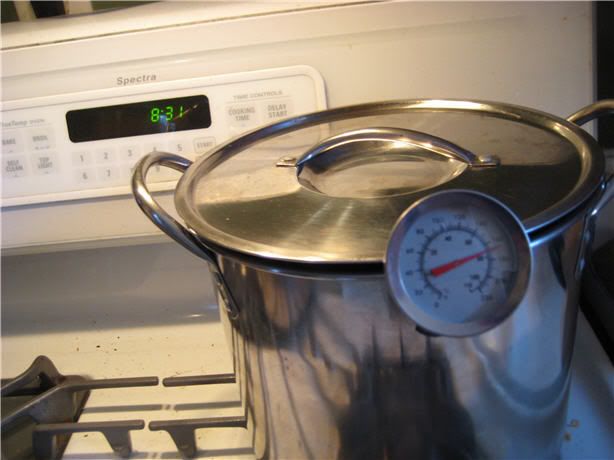
- Starter airlock bubbling once every 5 or 6 seconds
- I’m going to move brew day up from 1/17 to tomorrow, 1/16 because the activity of the starter is beginning to decrease today
1/16/11 – Brew Day Notes
- 8:00, rise and shine. Reached strike water temps at about 8:30am.
- 70 min. mash at 152* to start, though ended at 140* (not happy with my cooler – it has lost 10 degrees over the course of an hour during every mash, and this time I even mashed in my house instead of the garage and wrapped the cooler in snuggies, yes snuggies).
- Loooooong and slow sparge from about 10:00am-1:00pm.
- 90 min. boil, 1/2 oz Challenger in at 90″ and 1 oz. Fuggles in at 30″
- chilled down to 60* and roused starter (had been bubbling every 8 sec. but after rousing it accelerated to every 4 sec.)
- final volume was a bit low (I estimate I started with 6.5-7 gal.) and my brix reading was a bit high at 15.8 so I had no problem adding about 1/3+ gal. of spring water to get the volume up and bring down the brix reading down. OG = 14 brix = 1.057 which is a bit higher than the target range of 1.048-1.054 but that’s fine. I have a healthy yeast starter so I’m not worried about later having unfinished fermentation, and I’m not far off target anyway.
- 3:45pm pitch
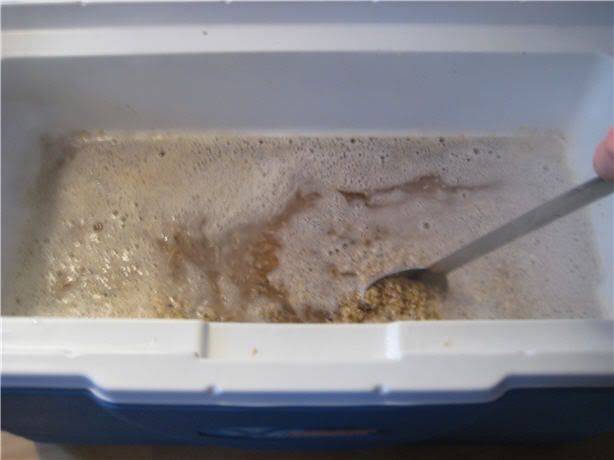
- Just ran the calculations – if I ferment down to 1.012 this beer will be nearly 6.1% ABV once done, one of the stronger beers I’ll have made. Target is 1.012-1.014 for this recipe
1/17/11
- Airlock wasn’t really bubbling 6 hrs. after pitch but it was bubbling every three or four seconds 16 hours after pitch (at 8:00am the day after brew day)
- 24 hrs. after pitch, activity is high and airlock is bubbling every two seconds, couldn’t be going much faster
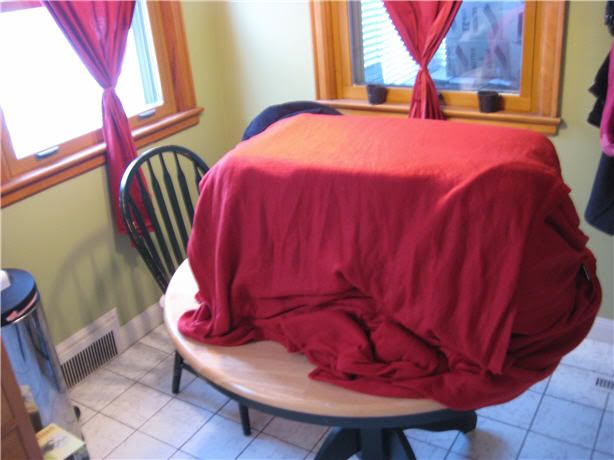
Snuggies and mashing inside still didn't prevent me from losing 10 degrees over 70 min...
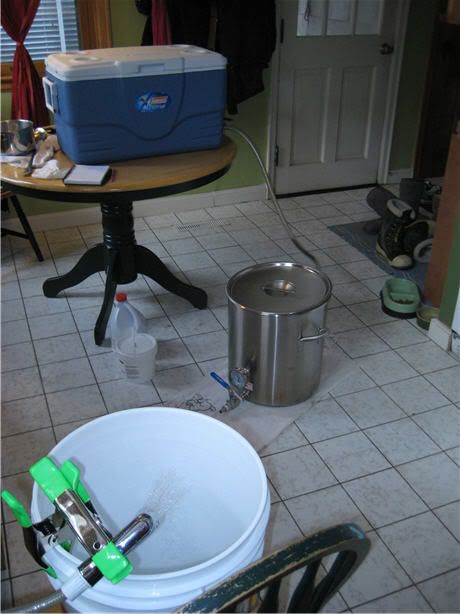
A very long sparge, roughly 3 hours

Spent grains, delicious? Kind of...
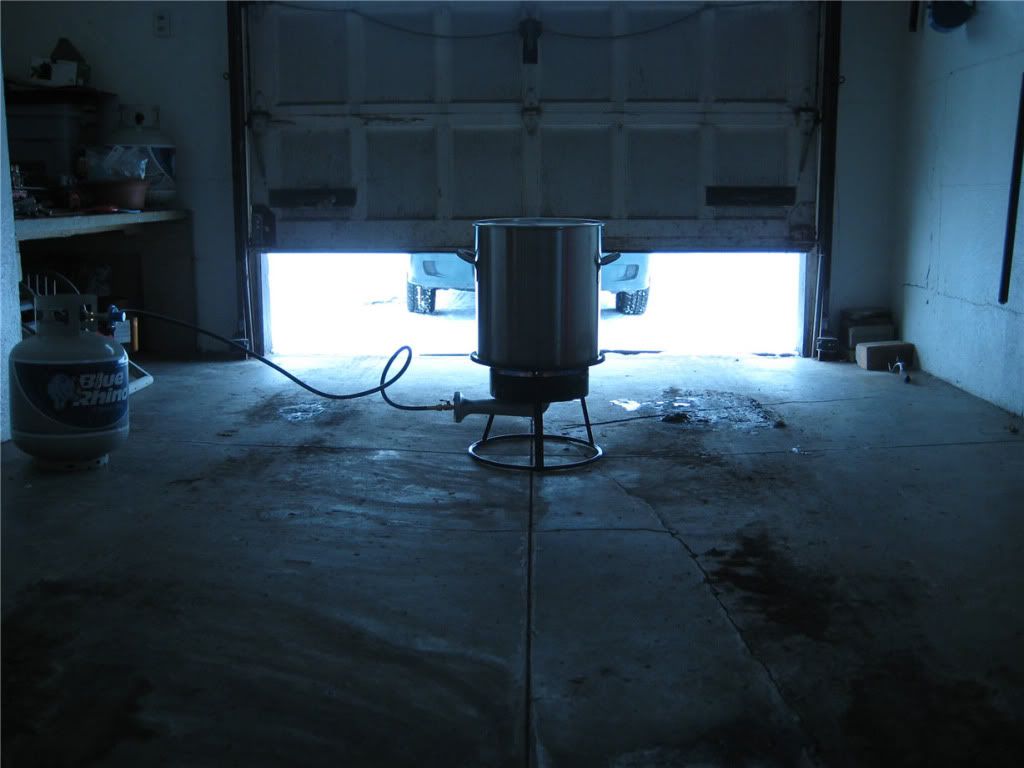
90 min. boil
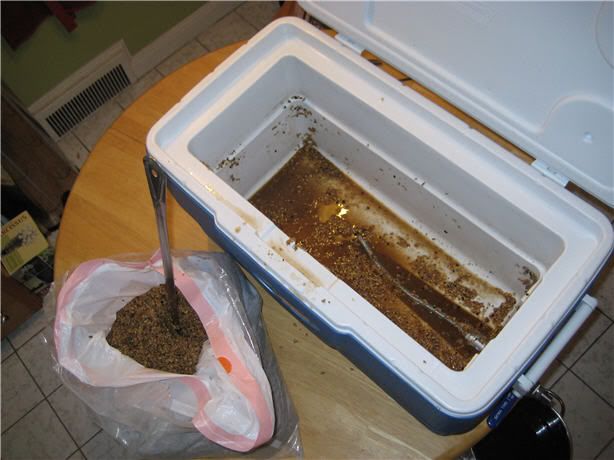
Not fun cleaning out the mash tun
These next few shots illustrate how I use my wort chiller in the winter. I hook up a garden hose to the chiller from the basement set-tub, run the water upstairs and through the chiller, then out into the upstairs sink.
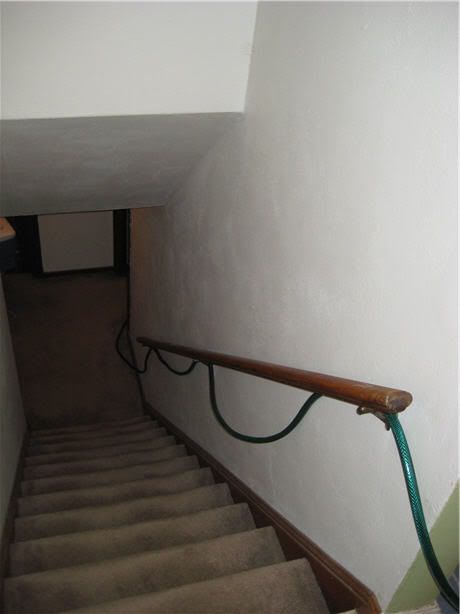

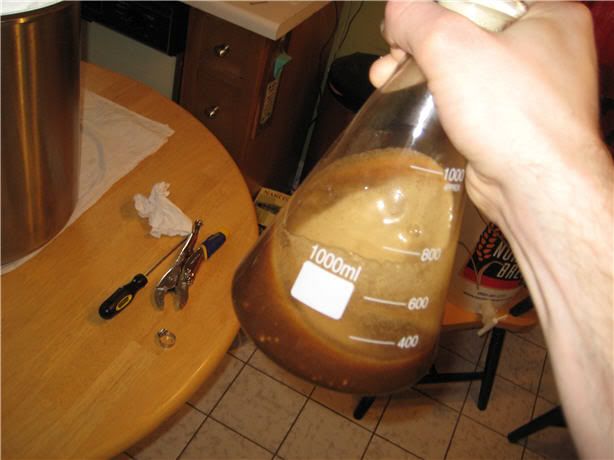
Rousing the yeast starter just before the pitch
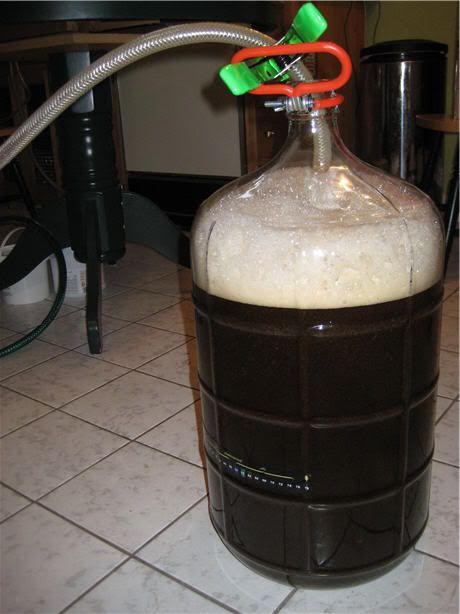
The full volume of wort from the boil kettle

The batch fermenting away 24 hrs. after pitch

Pingback: Tweets that mention Scootin’ Scottie Ale « barkingdogbeer -- Topsy.com
Pingback: Final round of the NHC competition is today « Barking Dog Beer
Pingback: 2011 State Fair Homebrew Competition « Barking Dog Beer